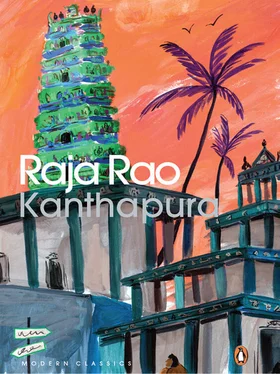Raja Rao - Kanthapura
Здесь есть возможность читать онлайн «Raja Rao - Kanthapura» весь текст электронной книги совершенно бесплатно (целиком полную версию без сокращений). В некоторых случаях можно слушать аудио, скачать через торрент в формате fb2 и присутствует краткое содержание. Год выпуска: 2014, Издательство: Penguin, Жанр: Классическая проза, на английском языке. Описание произведения, (предисловие) а так же отзывы посетителей доступны на портале библиотеки ЛибКат.
- Название:Kanthapura
- Автор:
- Издательство:Penguin
- Жанр:
- Год:2014
- ISBN:нет данных
- Рейтинг книги:3 / 5. Голосов: 1
-
Избранное:Добавить в избранное
- Отзывы:
-
Ваша оценка:
- 60
- 1
- 2
- 3
- 4
- 5
Kanthapura: краткое содержание, описание и аннотация
Предлагаем к чтению аннотацию, описание, краткое содержание или предисловие (зависит от того, что написал сам автор книги «Kanthapura»). Если вы не нашли необходимую информацию о книге — напишите в комментариях, мы постараемся отыскать её.
Kanthapura — читать онлайн бесплатно полную книгу (весь текст) целиком
Ниже представлен текст книги, разбитый по страницам. Система сохранения места последней прочитанной страницы, позволяет с удобством читать онлайн бесплатно книгу «Kanthapura», без необходимости каждый раз заново искать на чём Вы остановились. Поставьте закладку, и сможете в любой момент перейти на страницу, на которой закончили чтение.
Интервал:
Закладка:
And Nanjamma said, ‘Why, that’s the story, The Red Pyre, in. what’s that woman?. Saradamma, yes, in Saradamma’s novel,’ and Rangamma said, ‘Of course, of course, and we are but unworthy of all these people and of all the people who are in the Congress and who fight with the Congress — Kamaladevi and Sarojini Naidu and Annie Besant, all the heroic daughters who fight for the Mother — and we, we think of nothing but the blowpipe and the broomstick, and the milking of the many cows. We, too, should organize a Volunteer corps, and when Moorthy returns we shall go to meet him like they do in the city.’ And we all said, ‘That will be beautiful!’ and each one said, ‘I shall wear the Dharmawar sari and the diamond hair-flower’—’And I shall wear the sari I wore at Nanjamma’s daughter’s marriage, that everybody liked so much, and I shall wear the gold belt too,’ and those who were widows said, ‘Well, I shall wear only the gold belt and the necklace, now that I cannot wear the bangles,’ and Ratna said, ‘I shall part my hair to the left, and wear just a tiny kumkum mark and wear the sari till it reaches the toes and it will float and flutter so well’; and Rangamma said, ‘We shall offer him arathi,’ and all our hearts gladdened; and we said, ‘That will be like a bridegroom’s welcome ceremony to go and meet Moorthy on the Karwar road by the Kenchamma temple,’ and we said, ‘We shall do as you like, sister,’ and that is how we became Volunteers. And Rangamma said, ‘Let us not call ourselves Volunteers — let us call ourselves Sevika Sangha,’ and we were called Sevis.
And when our men heard of this, they said: was there nothing left for our women but to vagabond about like soldiers? And every time the milk curdled or a dhoti was not dry, they would say, ‘And this is all because of this Sevi business,’ and Radhamma’s husband beat her on that day he returned from village inspection, though she was seven months pregnant. And Post-office Satamma’s husband would not talk to her: ‘Why, soon it will be as if the men will have to wear bangles and cook, so that you women may show yourselves off! You shall not set your feet in Rangamma’s house again!’ Rangamma goes to him and says, ‘So you are not a Gandhi’s man. Because Moorthy is in prison you are no more a Gandhi’s man,’ and Suryanarayana says, ‘I am a Gandhi’s man, Aunt. But if I cannot have my meals as before, I am not a man to starve. ’ and Rangamma says, ‘If you don’t have your meals on time, it is not because of our Sevika Sangha. We practise only in the afternoon,’ and then Suryanarayana says, ‘I don’t know, Aunt, but I want my wife to look after my comforts and I go out every morning and come home in the evening through rain and dark and storm,’ and Rangamma says, ‘Of course, Satamma has to look after your comforts. If we are to help others, we must begin with our husbands,’ and she tells Satamma, ‘Your husband is not against Sevika Sangha. He only wants to eat on time.’ Satamma grumbles and swears and says she serves him on time, and it is all false; but Rangamma tells her to be more regular in cooking, and we all say, ‘We should do our duty. If not, it is no use belonging to the Gandhi group.’ Rangamma says, ‘That is right, sister,’ and we say, ‘We shall not forget our children and our husbands.’ But how can we be like we used to be? Now we hear this story and that story, and we say we too shall organize a foreign cloth boycott like at Sholapur, we too, shall go picketing cigarette shops and toddy shops, and we say our Kanthapura, too, shall fight for the Mother, and we always see the picture of Rani Lakshmi Bai that Rangamma has on the veranda wall, a queen, sweet and young and bejewelled, riding a white horse and looking out across the narrow river and the hills to where the English armies stand. And what do you think? — one day, Sata’s Rangi came running to us and said, ‘Aunt, I was playing with Nanju. And I said to him, you shall be the British army, and Ramu will be the Kashi maharaj and the Oudh maharaj and the Punjab maharaj, and I will be Rani Lakshmi Bai, and he says he wants to be the Rani, and I say, “But I am the woman,” and he says, “That does not matter,” and I say, “I am the woman,” and he says, “I will not play,”’ and Rangamma calls the children and says, ‘You will be Rani Lakshmi Bai once, and you will then put on a turban, and he will put a kumkum mark on his face and he will be Rani Lakshmi Bai,’ and the children were so happy at this that they went away puffy-cheeked and satisfied.
And sometimes, when we stood in Rangamma’s courtyard, Rangamma would say, ‘Now, if the police should fall on you, you must stand without moving a hair,’ and we would feel a shiver run down our backs, and we would say, ‘No, sister, that is too difficult,’ and Rangamma would say, ‘No, sister, that is not difficult. Does not the Gita say, the sword can split asunder the body, but never the soul? And if we say, we shall not move a hair, we shall not move a hair.’ And one day Nanjamma came and said, ‘Sisters, last night I dreamt my husband was beating me and beating me, and I was crying and my bangles broke and I was saying, “Oh, why does he beat me with a stick and not with his hands?” and then when I saw him again, it was no more my husband, it was Badè Khan, and I gave such a shriek that my husband woke me up. Sister, I cannot fight like that,’ and Rangamma said, ‘Well, you will be with us, and if the fight begins, I shall say, “Are you ready to fight with us, sister Nanjamma? Ready to fight without moving a hair?” and if you say, “Yes, sister,” you will come with us, and if you say, “No,” we shall say, “That does not matter, our Nanjamma is only afraid,”’ and we say, ‘That is a fine thing, for we cannot say if we can face the police lathis.’ But Rangamma says, ‘When you and your daughters and your husbands walk the holy fire, does it scorch or not, sisters?’ and we say, ‘No, no, Rangamma’—’When Madanna and Rajanna and Siddayya smite their bodies with swords, when the grace of Kenchamma has touched them, does it cut them, sister?’ and we say, ‘No, no, Rangamma’—’When That-house Srikanta was graced by the goddess every Tuesday and fell flat on the ground in adoration, did you ever see a bruise on his skin, sisters?’ and we say, ‘No, no, Rangamma’—’Well, we shall fight the police for Kenchamma’s sake, and if the rapture of devotion is in you, the lathi will grow as soft as butter and as supple as a silken thread, and you will hymn out the name of the Mahatma.’ And we all grow dumb and mutter, ‘Yes, sister, yes,’ and then Venkatalakshmi says, ‘But, sister, there will be Moorthy, too, and he will defend us,’ but Rangamma merely waves her hand and says, ‘We shall see, we shall see. ’
And sometimes Seenu or Vasudev would come when we did our exercises, and they would say, ‘We, too, should organize such a corps, but the boys will not come,’ and Rangamma says, ‘Why in your Pariah school you must have some boys,’ and Seenu says, ‘No, Rangamma. Since the arrest of Moorthy they are all afraid. They say, “We are not all going to sit behind the cage-bars like kraaled elephants,” and when I say, “What does that matter, we are for the Mahatma,” they say, “Yes, yes, learned sir, but our lands will go uncultivated, and there will be neither child nor woman to pull the weeds or direct the canal water,” and I say, “We are fighting so that the rents may be lowered and the foreign rule vanish, and you will all live happily,” and they say, “Oh, Father, we cannot hope for Ramarajya in these days; we live in Kaliyuga, learned sir,” and I say, “So you will not fight for the Mahatma and Moorthy?” and they say, “Nay, nay, we shall fight, but we don’t want the prison,” and the women say, “Oh, it’s good as things are, and we haven’t more holes in the mouth for more morsels,” and with this and that they are growing weaker and weaker. But Rangè Gowda says, “Let the harvests be over, and we shall cane these idiots to follow you,” and I tell Rangè Gowda he should be with us, and he says, “With whom am I then?” and he gets angry, and I say, “You are with us of course, Rangè Gowda,” and some day we, too, shall organize a Volunteer corps. But, sister, you can have your eleven Volunteers in the courtyard, for you are women. But when Badè Khan sees us, he will fall on us.’ And Vasudev says, ‘In the Estate he spits and beats everyone. Already he has moved down to the hut by the main gate, and he and his dog and his woman keep guard over everyone that crosses the stile. But, sister, the fever of the country has got him, too, and he moans heavily from his bed. And his woman is not so bad, you know. When she sees me, she winks and lays her head upon her hand to say “He is asleep,” and I slip out like a rat. After all, she is one of us. ’
Читать дальшеИнтервал:
Закладка:
Похожие книги на «Kanthapura»
Представляем Вашему вниманию похожие книги на «Kanthapura» списком для выбора. Мы отобрали схожую по названию и смыслу литературу в надежде предоставить читателям больше вариантов отыскать новые, интересные, ещё непрочитанные произведения.
Обсуждение, отзывы о книге «Kanthapura» и просто собственные мнения читателей. Оставьте ваши комментарии, напишите, что Вы думаете о произведении, его смысле или главных героях. Укажите что конкретно понравилось, а что нет, и почему Вы так считаете.












